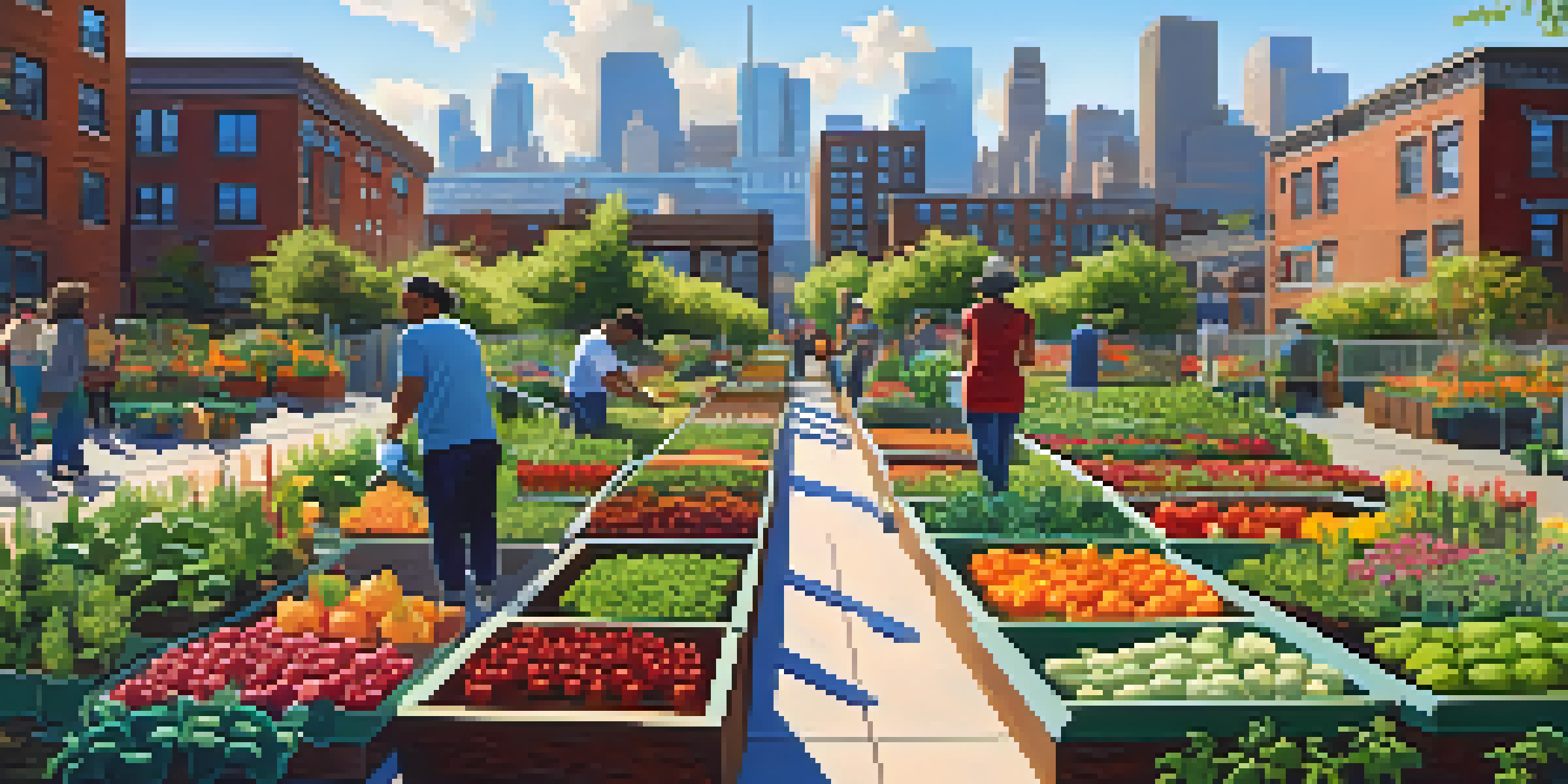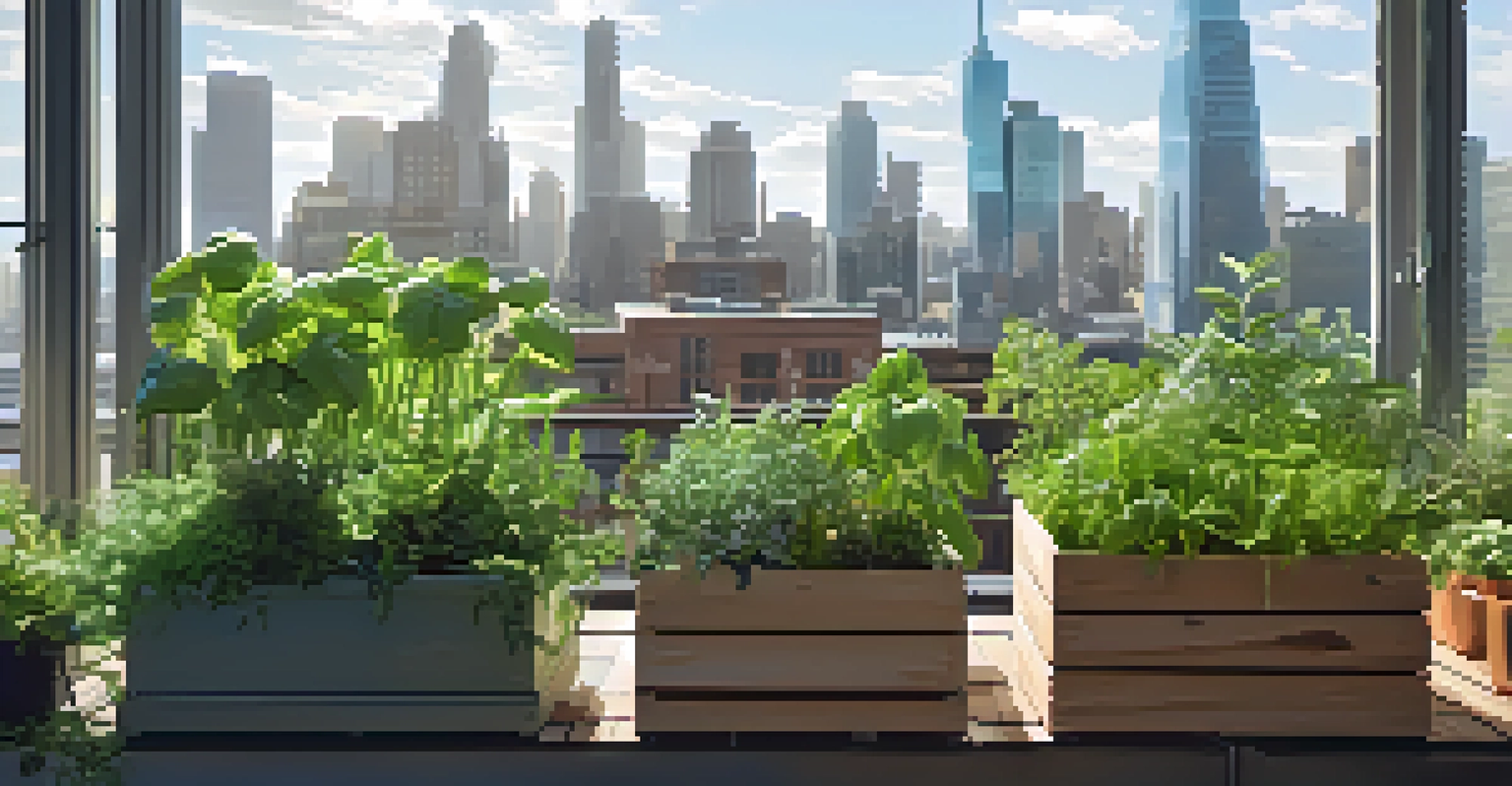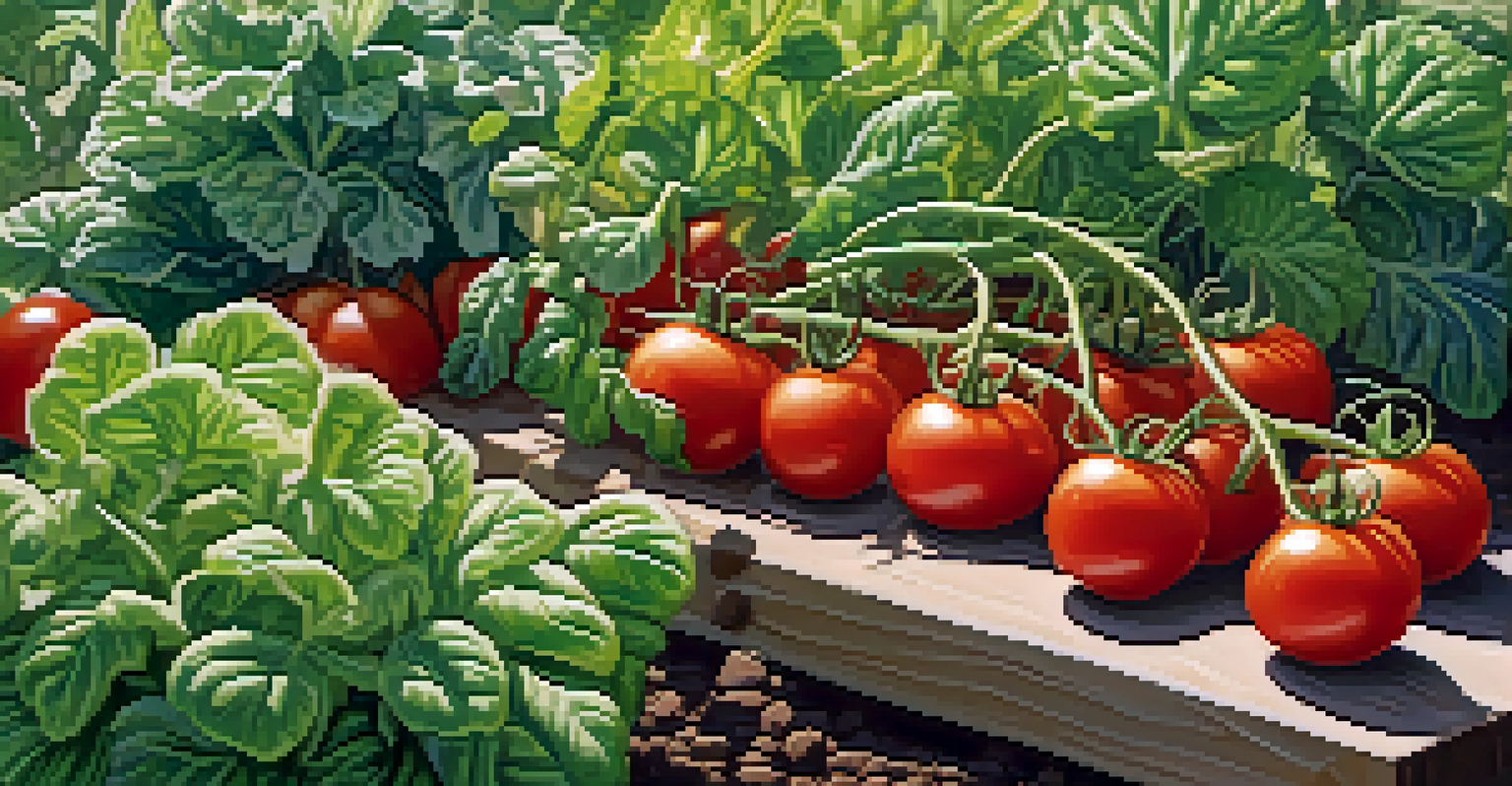The Role of Urban Gardening in Mitigating Climate Change Effects

Understanding Urban Gardening and Its Importance
Urban gardening refers to the practice of cultivating, processing, and distributing food in or around urban areas. It’s a way to bring nature into our cities, allowing people to grow their own fruits and vegetables in limited spaces. This practice not only beautifies neighborhoods but also fosters community interaction and awareness about food sources.
The greatest threat to our planet is the belief that someone else will save it.
As cities continue to grow and populations increase, the need for sustainable food sources becomes critical. Urban gardening can significantly reduce the carbon footprint associated with transporting food from rural farms to city dwellers. By growing food locally, we diminish the reliance on fossil fuels and help reduce greenhouse gas emissions.
Additionally, urban gardens can improve air quality by absorbing pollutants and producing oxygen. They act as green lungs for the city, providing a much-needed escape from concrete and asphalt. This dual benefit of food production and environmental enhancement makes urban gardening a vital practice in the fight against climate change.
Mitigating Urban Heat Islands with Green Spaces
Urban areas often experience the 'heat island effect,' where temperatures are significantly higher than in surrounding rural areas due to human activities and infrastructure. Urban gardens can help mitigate this effect by providing shade and cooling through evapotranspiration. Imagine a city block filled with lush greenery instead of barren concrete; this simple change can lower temperatures and create a more comfortable environment.

By incorporating more greenery into our cities, we can also reduce the energy needed for cooling buildings. Studies have shown that buildings surrounded by vegetation require less air conditioning, leading to lower energy consumption and reduced carbon emissions. This creates a win-win situation, where both the environment and residents benefit from cooler temperatures.
Urban Gardening Enhances Food Security
By growing food locally, urban gardening helps communities reduce dependence on external sources and increases resilience against supply chain disruptions.
Furthermore, urban gardens can enhance biodiversity by providing habitats for various species, including pollinators like bees and butterflies. This increase in biodiversity contributes to a more resilient ecosystem, better equipped to withstand the challenges brought on by climate change.
Urban Gardens as Carbon Sinks
Plants play a crucial role in capturing carbon dioxide, one of the primary greenhouse gases responsible for climate change. Urban gardens act as carbon sinks, absorbing CO2 from the atmosphere and utilizing it for growth. Even a small garden can make a significant difference in the amount of carbon captured, contributing to overall climate mitigation efforts.
Gardening adds years to your life and life to your years.
Moreover, urban gardening encourages practices like composting, which further enriches the soil and enhances its ability to store carbon. When organic waste is composted instead of sent to landfills, it reduces methane emissions—a potent greenhouse gas. This simple act can turn waste into a valuable resource, closing the loop on urban sustainability.
By promoting carbon capture and reducing waste, urban gardens serve as a powerful tool in the climate change toolbox. Every garden cultivates a healthier planet, showing that local actions can have a far-reaching impact.
Enhancing Food Security Through Local Production
Food security remains a pressing global issue, and urban gardening can help address this challenge. By growing food locally, communities can reduce their dependence on external food sources, which may be vulnerable to supply chain disruptions. When cities grow their own food, they become more resilient against global crises, including climate-related disasters.
Urban gardens also promote the idea of fresh, healthy eating. Access to fresh produce can improve nutrition, particularly in food deserts where grocery stores are scarce. This not only benefits individual health but contributes to the overall well-being of the community.
Community Bonds Through Gardening
Community gardens foster social cohesion by bringing people together, promoting teamwork, and enhancing relationships among diverse residents.
Additionally, urban gardening can empower individuals, encouraging them to take control of their food sources. This sense of ownership fosters a deeper connection to the environment and inspires sustainable practices. In essence, urban gardening can be a cornerstone of food justice, ensuring everyone has access to nutritious food.
Building Community and Social Cohesion
One of the most beautiful aspects of urban gardening is its ability to bring people together. Community gardens, in particular, create spaces for residents to collaborate, share knowledge, and cultivate relationships. These gardens often become hubs of social activity, fostering a sense of belonging and community spirit.
Engaging in gardening activities promotes teamwork and cooperation, as individuals from diverse backgrounds come together to share their love for nature and food. This collaboration can lead to cultural exchange and increased understanding among community members, further strengthening social bonds.
Moreover, urban gardens can serve as educational platforms, teaching people of all ages about sustainable practices, nutrition, and environmental stewardship. By working together, communities can empower themselves to tackle climate change collectively, creating a brighter future for all.
The Economic Benefits of Urban Gardening
Urban gardening isn't just good for the planet; it can also contribute to local economies. Community gardens can produce surplus crops that can be sold at farmer's markets, providing additional income for residents. This economic boost can help support local businesses and promote a thriving local food economy.
In addition to direct sales, urban gardening can create job opportunities in landscaping, horticulture, and education. As cities invest in green spaces, more positions will open up, providing employment to those who may have limited options. This helps create a sustainable and inclusive workforce that benefits everyone.
Economic Growth from Green Spaces
Urban gardening contributes to local economies by creating job opportunities, boosting property values, and supporting local food markets.
Furthermore, cities that prioritize urban gardening often see increases in property values and tourism. Green spaces enhance the aesthetic appeal of neighborhoods, making them more attractive to potential residents and visitors alike. Ultimately, investing in urban gardening can lead to a more vibrant and economically viable community.
Policy Support for Urban Gardening Initiatives
To fully realize the benefits of urban gardening, supportive policies are essential. Local governments can play a significant role by implementing regulations that promote community gardens, such as zoning laws that allow for urban agriculture in residential areas. When policies encourage gardening, they help cultivate an environment where green initiatives can thrive.
Additionally, providing grants or funding for community garden projects can empower neighborhoods to take action. These financial resources can help cover initial costs, making it easier for communities to start their own gardening initiatives. When people have the support they need, they are more likely to engage in sustainable practices.

Finally, educating city planners and policymakers about the benefits of urban gardening is crucial. By understanding how these initiatives can mitigate climate change and enhance community well-being, decision-makers can prioritize green spaces in urban development plans. This collective effort can pave the way for a greener, more resilient future.